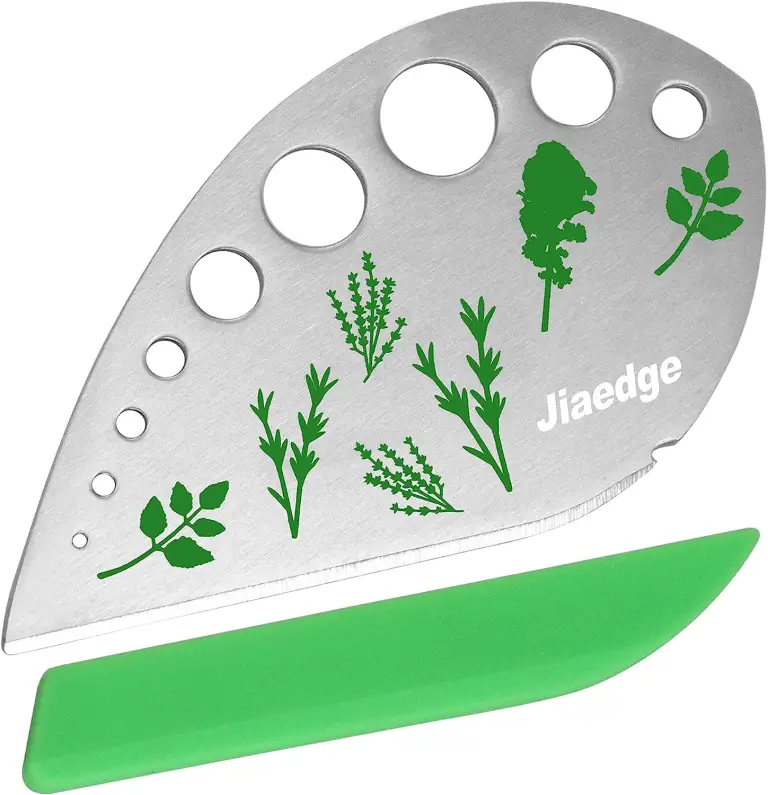Whether fresh or dried, herbs make dishes more flavorful. They add to the taste and the texture and are irreplaceable part of every cuisine.
Of course, it’s safe to say that when used fresh, herbs intensify the taste even further. One drawback, however, of using fresh herbs instead of their dried counterparts is the time it takes to wash them, strip them, and chop them. This is one of the reasons people avoid using them when cooking.
Luckily, there are kitchen tools and gadgets which facilitate the process of preparing herbs to use them fresh. One of those is the underrated herb stripper.
This tool, which speeds the process of preparation significantly, helps remove leaves from stems. They come with different sized holes to fit different herbs, including bigger leafy vegetables as kale.
The usage is pretty simple. All you need to do is place the stem on one side of the fitting hole and pull it through until all the leaves come off.
Some herb strippers come with a blade and have bowls attached to catch the leaves as they go through the holes.

Speaking of herbs and their wide usage in the cuisines from every corner of Earth, below is a list of some of the most widely used fresh herbs.
Basil is a flavorful, leafy green herb which comes in many varieties. Popular as a food seasoning and the main ingredient of the popular pesto sauce, this herb has found its way to almost every cuisine, despite being commonly found in Mediterranean recipes.
To get the most out of this herb add the leaves toward the end of the cooking process.
Rosemary goes ideally with dishes like lamb chops, chicken, roast beef, and roasted potatoes. However, it is also perfect for flatbread, sweet potato fries, and even in cake. The thing is that this herb is tough to prepare, which makes the herb stripper the ideal tool to use with it.
Cilantro, which comes from the fresh leaves of the coriander plant, is a herb that you either love or hate incorporated in your food. It is, however, a staple in Asian and Latin American food. Fresh cilantro tastes pungent, bright, lemony, and a little peppery, but many say it tastes like soap.
Dill, often paired with salmon, potatoes, and yogurt-based sauces, is commonly used to elevate the flavor of various dishes. It’s a delicate herb with a strong, fresh, earthy flavor.
Marjoram‘s flavour could be described like that of oregano, but milder and yet intense. While its leaves are nicely paired with salads, soups, sauces, and fish, its stems bring out the flavor when used in a stock or soup.
Thyme has a distinctive taste and that makes it a culinary staple to this day. Fresh leaves or whole sprigs can be used for meat or poultry. Thyme is also an excellent ingredient to use with fish. It also goes well in coctails.
Mint is used with a variety of dishes and goes well on top of fruit salads. It not only adds flavour, but it also helps reduce the intake of sodium and sugar at those who consume it. It is best to add raw mint leaves at the end of the cooking process. This helps them maintain their delicate flavor and texture.
Parsley is one of the most versatile herbs there are. Although the possibilities of its usage are endless, parsley is especially delicious with pasta, butter, eggs, and lemon.
Oregano is a herb quintessential to recipes like chili pasta and pizza sauces. Oregano provides antioxidants when people consume it in the diet. It can be grown in a pot on a windowsill or balcony or in the garden. It is a perennial, which means it can grow all year.
Please SHARE this article with your family and friends on Facebook.
Bored Daddy
Love and Peace
